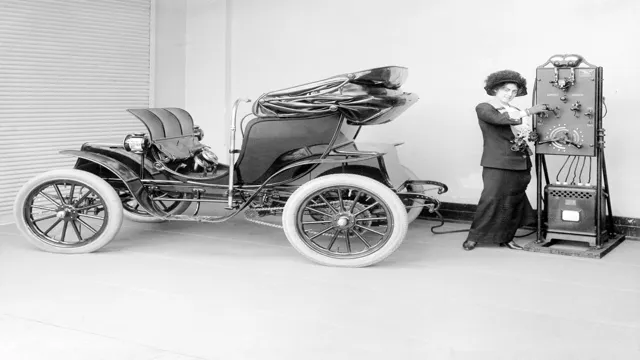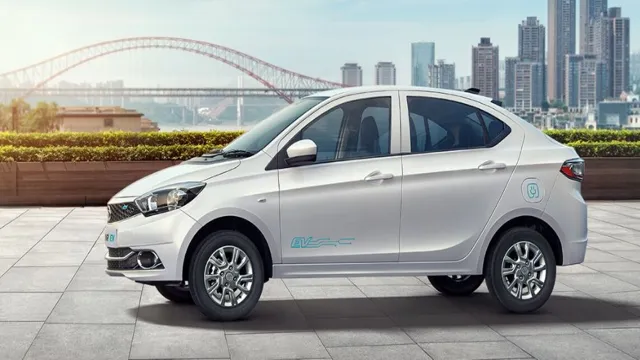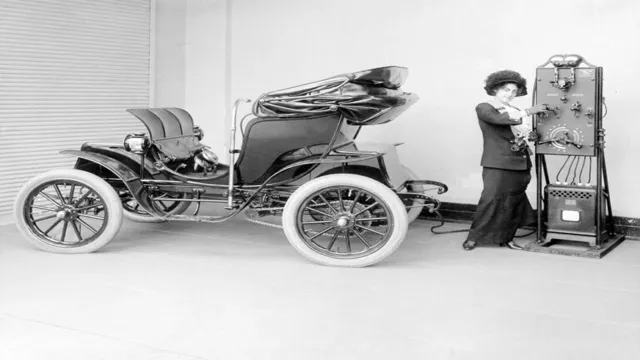The Shocking Truth Behind the Debut of Who Killed the Electric Car? on This Day in History
Welcome to my blog, where today we’ll be discussing the thought-provoking documentary “Who Killed the Electric Car?” This film delves into how electric vehicles were suddenly removed from the market in the early 2000s, with many people questioning why such a promising technology was seemingly sabotaged. The documentary raises many intriguing questions about the state of the auto industry and the power of big oil companies. As we explore this fascinating topic, we will examine the specific individuals and organizations who may have played a role in the downfall of electric cars.
Was it the government? Auto manufacturers? Oil companies? Or a combination of all three? We will also delve into some of the likely reasons why electric cars were perceived as such a threat to the status quo. The documentary does more than just investigate the demise of the electric car, it paints a portrait of a deeply entrenched system that plays a powerful role in the decisions we make about our transportation. By taking us on a journey through the fate of the electric car, it opens up a wider conversation about the links between technology and politics, and how progress can quickly be halted by powerful interests with a stake in outdated ways of doing things.
Whether you’re an electric vehicle enthusiast or simply interested in the inner workings of the auto industry, this documentary is sure to leave you with plenty of food for thought. Join me on this journey as we delve into the complex world of electric cars and uncover the truth behind their mysterious disappearance.
The Debut and Disappearance
On this day in history, the electric car made its debut in the late 1990s, but it was abruptly taken off the market soon after. The documentary “Who Killed the Electric Car?” explores this short-lived phenomenon and the reasons behind its disappearance. The electric car promised to be a sustainable and environmentally friendly alternative to traditional gasoline-powered cars.
However, despite initial success and positive reviews from consumers, the major automakers failed to support the production and marketing of the electric car. Factors such as pressure from the oil and auto industries, lack of government incentives, and limited consumer demand ultimately led to the demise of the electric car. This unfortunate turn of events raises questions about corporate responsibility and the importance of sustainable technology in shaping our future.
As we continue to face challenges around environmental sustainability, the electric car’s story remains a poignant reminder of the power dynamic that exists between corporations, governments, and individuals in determining our collective future.
Introduction to the EV1
The EV1 is widely regarded as one of the very first electric cars to hit the market. It was introduced in 1996 by General Motors (GM) and was a groundbreaking moment for the industry. The car was designed to be environmentally friendly, energy-efficient, and reliable.
It boasted a range of up to 80 miles on a single charge, which was quite an achievement at the time. Unfortunately, the EV1 was met with a lot of resistance from traditional automakers and oil companies, who saw the electric car as a direct threat to their businesses. As a result, the EV1 was eventually discontinued in 2003, much to the disappointment of its fans and supporters.
Nevertheless, the introduction of the EV1 paved the way for the future of electric cars and inspired many other manufacturers to jump on the bandwagon.

Popularity and Promises Kept
When it comes to the music industry, the debut of an artist can be make or break for their career. Some artists can instantly become a chart-topping sensation, while others may never gain much traction. This is exactly what happened with the disappearance of some artists who debut with a bang but then quickly fade into obscurity.
Popularity is fickle, and it can be hard to maintain once you’ve reached the heights of success. However, it’s not always just about popularity. Keeping promises made to fans, such as releasing new music on schedule, can be just as important.
In the end, the combination of both popularity and keeping promises is what can make an artist truly successful in the music industry.
Conspiracy or Collusion?
The who-killed-the-electric-car-debuts conspiracy theory has been floating around for years, but was it really a conspiracy or just collusion by the auto industry? The documentary brought to light the story of electric cars being brought to market, only to mysteriously disappear. Some believe that oil companies and car manufacturers working together to suppress electric car technology and keep their profits high, led to the demise of this eco-friendly alternative. However, others argue that it was simply a case of consumer demand not meeting the high cost and limited range of the electric vehicles.
Regardless of the reason, the story serves as a cautionary tale about the murky waters of big business and the role they play in shaping our choices. The debate continues on whether the electric car was truly a victim of conspiracy or just a victim of the market.
Political and Economic Factors
The ongoing debate around political and economic factors often raises questions of whether there exists a global conspiracy or collusion. While there is no clear answer, there have been instances in the past where political leaders and financial institutions have been caught red-handed colluding with each other. The most notable example of this is the 2008 financial crisis, where major banks and financial institutions engaged in reckless behavior, leading to a devastating global financial meltdown.
Other examples include the pharmaceutical industry’s significant influence on government policies and international organizations, resulting in skyrocketing drug prices and limited access to healthcare for the masses. However, not all instances of political and economic cooperation are nefarious. Governments often work with trade unions and corporations to promote economic growth and increase employment opportunities for their citizens.
Such collaborations can bring about positive change in society, but it is essential to keep a close watch on powerful organizations’ actions to ensure they act in the best interest of society rather than their own.
Big Oil’s Involvement
Big Oil’s involvement in various events throughout history has been a contentious topic for many. Some believe that there is a conspiracy among large oil companies to maintain a stranglehold on the industry, while others chalk it up to collusion and greed. The truth likely lies somewhere in between these two extremes.
There is no doubt that major players in the oil industry have a significant interest in maintaining their profits, and they have not shied away from using their resources to influence policy and public opinion. However, this does not necessarily mean that there is a grand conspiracy at play. It is more likely that these companies have similar interests and work together to protect their bottom line.
Regardless of where people stand on this issue, it is clear that the involvement of Big Oil in various political and environmental issues is something that should be carefully scrutinized. By doing so, we can ensure that decisions are made in the best interest of all people, not just those with the most money and influence.
Miscalculation of Demand
One of the most crucial factors in business strategy is predicting demand. Companies often use historical data, market trends, and other factors to estimate future demand for their products or services. However, miscalculation of demand can lead to significant consequences, such as overstocking or understocking products, which can result in significant financial losses.
In recent times, there have been debates on whether some companies intentionally manipulate demand to achieve their goals. Is it a conspiracy or collusion? Some experts argue that companies may be collaborating to intentionally create false demand to increase profits, while others contend that companies may simply make errors in their demand forecasting due to inaccurate data analysis. The truth is likely somewhere in between.
While a small fraction of companies may engage in illegal activities such as price-fixing, the vast majority is likely to make errors in predictions. Regardless of the cause, miscalculation of demand highlights the importance of accurate data analysis. Companies need to invest in reliable data analytics tools and hire skilled professionals capable of interpreting data to make informed decisions.
Moreover, companies must monitor market trends closely to adjust their strategies proactively. In conclusion, miscalculation of demand can have significant implications for business performance, particularly in today’s highly competitive marketplace. Whether it is due to unethical practices or human error, companies must take necessary measures to mitigate the risks and adopt sound best practices for demand forecasting.
By doing so, they can increase their chances of achieving their strategic objectives and outperforming their competitors.
Impact on Global Environment
The release of the documentary “Who Killed the Electric Car?” in 2006 sparked a conversation about the impact of vehicles on the global environment. The film explored the rise and fall of the electric car, questioning why advancements in electric vehicle technology were hindered and suggesting that the oil and auto industries may have played a role in their demise. While electric cars are now making a comeback with the rise of companies like Tesla, the impact of transportation on the environment remains a pressing issue.
As the world continues to grapple with the effects of climate change, it’s increasingly important for individuals and governments to consider the ecological impact of their transportation choices. From electric cars to public transit to biking and walking, there are many ways to reduce the environmental impact of transportation. By promoting clean transportation options and incorporating sustainable practices into our daily lives, we can work towards a healthier planet for present and future generations.
Carbon Emissions and Climate Change
Carbon emissions have had a profound impact on the global environment, causing significant changes in climate patterns around the world. Unfortunately, these emissions have been increasing rapidly over the past few decades due to the expansion of industry and transportation. The effects of these emissions can be seen in the increasing number of natural disasters, such as floods, droughts, and wildfires, which have devastating effects on the earth’s ecosystems and human populations.
Carbon emissions are also responsible for the shrinking of the polar ice caps, which are causing sea levels to rise, and coastal communities to become inundated with water. It’s crucial that we work together to reduce our carbon footprint and prioritize the health of our planet. By using more sustainable practices, such as renewable energy and reducing waste, we can make a significant impact on the future of our planet and our species.
Future of Electric Cars
Electric cars have been touted as the future of transportation due to their numerous benefits to the environment. With concerns about global warming, climate change, and air pollution, countries around the world are taking steps to reduce greenhouse gas emissions. Electric cars offer a cleaner and more sustainable option for personal transportation, reducing carbon emissions and improving air quality.
By switching to electric cars, we can significantly reduce the amount of air pollution generated by traditional gasoline-powered vehicles. This, in turn, can improve overall health and well-being for people in the communities affected by air pollution. Additionally, by using renewable energy sources to power electric cars, we can reduce our dependence on fossil fuels and reduce our carbon footprint.
The adoption of electric cars is a step in the right direction towards reducing the impact on the global environment and creating a sustainable future.
Conclusion
After watching “Who Killed the Electric Car?” it becomes clear that the real culprits behind the demise of this eco-friendly innovation were not just individual car owners or automobile companies. Rather, it was a complex system of economic and political factors that conspired to bring down this promising technology. Whether you blame it on the lack of government support, industry lobbying, or just the sheer force of consumer demand, one thing is clear: the electric car had a bright future ahead of it, but sadly, it was cut off before its time.
However, as we continue to grapple with the environmental challenges of our time, it’s clear that the spirit of innovation and progress that once fueled the electric car is still very much alive and well today. So let’s learn from the past and continue to push for a brighter, more sustainable future for all.”
FAQs
What was the documentary “Who Killed the Electric Car?” about?
“Who Killed the Electric Car?” was a documentary film that examined the demise of the electric car in the 1990s, focusing on the implications for the American automobile industry and its consumers.
When was “Who Killed the Electric Car?” first released?
“Who Killed the Electric Car?” was first released on June 28, 2006.
Who directed “Who Killed the Electric Car?”?
“Who Killed the Electric Car?” was directed by Chris Paine.
What were the main factors that led to the failure of electric cars in the 1990s?
According to the documentary, the main factors that contributed to the failure of electric cars in the 1990s included the opposition of the oil and auto industries, lack of government support, and consumer misconceptions about the capabilities of electric cars.
Was “Who Killed the Electric Car?” well-received by critics and audiences alike?
Yes, “Who Killed the Electric Car?” was generally well-received by critics and audiences alike, and is often credited with helping to raise awareness about the issues surrounding electric cars and the need for sustainable transportation.







